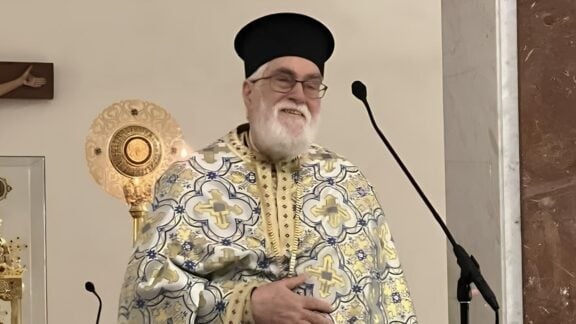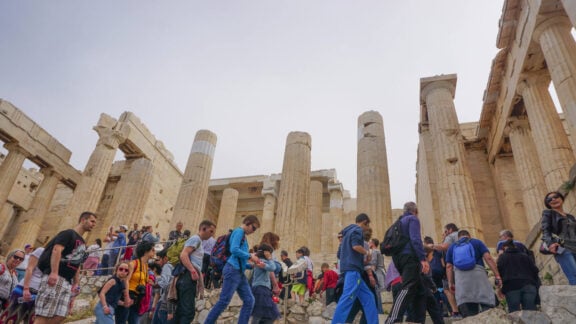Taking an assured place among the most creative authors and administrators of his time in Australasia was Hellenist and Academician Michael John Osborne (25 January 1942-23 June 2024). Osborne arrived from Britain in 1983 to make an enormous contribution to the tertiary sector in Australia and to Hellenic studies, initially as Professor of Classics at the University of Melbourne (1983-1989) and then arguably as one of the most vigorous and resourceful Australian Vice-Chancellors of his era (1990-2006) at La Trobe University. Osborne brought with him from Oxford University, where he studied Classics and Hellenic epigraphy, a vision and passion for the humanities that is rarely seen in today’s university culture. In 1990, he accepted the highest academic post as Vice-Chancellor of La Trobe University, and implemented for the next sixteen years, until his retirement in 2006, his bold administrative and academic policies, elevating his institution to the status of one of the best 100 tertiary institutions in the globe. Osborne exerted a mighty influence on the formation of Hellenic Studies in Australia and China which expanded, grew more powerful and became more efficient under his inspiring guidance. He felt a strong attraction towards the ancient civilisations of Greece and China and was highly engaged in cultural exchange activities, earning the respect of successive foreign government institutions.
Under Osborne’s care Hellenic studies and the Greek language attained their full development in Melbourne, exercising also extensive influence in Australia and China. The subjects flourished under his leadership, expanding teaching and research, and engaging with the Greek community in Australia. His commitment to the study of Hellenism in Australia and China has been received with enormous gratitude by the Hellenes in Australia, Greece, and Cyprus, which bestowed upon him numerous awards and high distinctions. He was elected a corresponding member of the Academy of Athens; awarded a Doctorate of Letters by the National and Kapodistrian University of Athens and was proclaimed a Laureate of the Aristotle Award by the Greek State (1998). Yet his overriding contribution was the establishment of the National Centre for Hellenic Studies and Research at La Trobe University, making La Trobe one of the most Hellenised universities and one of the best 100 Universities in the world.
Michael John Osborne was born in England and attended Eastbourne Grammar School before studying classical studies and archaeology at Christ Church, Oxford (1961-1965), attaining his BA Literae Humaniores (Class I), Oxford (1965), his MA Literae Humaniores, Oxford (1968), and his Doctor of Philosophy and Letters (summa cum laude), Katholieke Universiteit te Leuven (Belgium). Osborne had a distinguished teaching career in Classical Studies and Archaeology as Lecturer and Senior Lecturer at the University of Bristol (1965-1966) and Lancaster (1966-1982), until his appointment as Professor and Head of Classical Studies, Modern Greek and Archaeology at the University of Melbourne (1983-1989).
Osborne’s greatest scholarly contributions have been in the field of Greek epigraphy and Greek history. He spent many years in Athens working on the topic of naturalized Athenian citizens, making many significant contributions to Athenian historical studies in his book Naturalization in Athens (four volumes 1981-1983). The corpus of inscribed Athenian citizenship decrees that comprises the first volume is a model for the publication of epigraphic evidence, providing definitive editions based on the painstaking study of the stones. The Lexicon of Greek Personal Names Vol. II (Attica), published in 1994, together with its companion volume Foreign Residents of Athens of two years later, and the massive publication by the Academy of Germany, Inscriptiones Graecae II – III Attica 300 – 228 BC (Editio Tertia) in 2015, written with his colleague Sean Byrne are the most significant enduring products of Osborne’s appreciation of the historical potential of the epigraphic record. Realization of such a project to analyse and present the data for all known residents of Ancient Athens, based necessarily on intimate engagement with the vast array of source material and expertise in the arcane area of Attic prosopography, requires perseverance and commitment.
For Australian and world Hellenes, Osborne was the first person to give expression to the new spirit of Philhellenism in Melbourne and attract due attention from their leaders and institutions. His Philhellenism was profoundly manifested with decisions and policies that made La Trobe University the most Hellenised University in the Hellenic Diaspora. He convinced the University Council to establish two Chairs in Hellenic Studies (the Zissis Dardalis Chair of Greek and the Professorship for the Director of the National Centre for Hellenic Studies and Research [NCHSR-EKEME] – arguably, one of the largest research centres for Hellenic Studies outside Greece). He also offered the use of six impressive buildings on the campus for the accommodation of the NCHSR and its activities, for ninety-nine years. The President of the Hellenic Republic, Kostis Stephanopoulos, the President of the Republic of Cyprus, Glafkos Clerides and the Prime Minister of Australia, Malcolm Fraser had granted their support and visited the NCHSR, becoming its patrons. Its staff comprising academics, researchers, computer analysts and administrators, was joined by several renowned scholars and Research Fellows from around the world.
The establishment of the NCHSR (1997-2008) and the Dardalis Chair of Greek Studies offered hope and opportunities for the continuance of the Hellenic spirit, its literature and culture, in Australia. Osborne’s Philhellenism became a delicate instrument capable of expressing the deepest humanitarian sentiments towards the children of Greek immigrants and thousands of students from the mainstream society. His love for Hellas was uncompromised. He was conscious of her glorious past and conceived an ardent affection for contemporary Hellenes. Everything in Hellas’ history became interesting, demonstrating over the years an indiscriminate praise of all things connected with classical life and letters. Let us read how he bonded his scholarly and personal interest with the Hellenes:
“My links with the Greek community in Australia began when I was appointed Professor of Classical Studies at the University of Melbourne, and an early event was participation in the Melbourne city delegation to Thessalonike to sign a sister city agreement. At the University of Melbourne, I had the opportunity to promote the shared program of Modern Greek between Melbourne, Monash, and La Trobe universities. After appointment as President of La Trobe University (in 1990) I was privileged to play a significant role in the establishment and development of the National Centre for Hellenic Studies and Research (EKEME) which became an important asset for the Greek community, indeed a beacon light for Hellenism in Australia (attracting in 2006 a rare and prestigious Onassis Award).
“As university President I had strong links with leading Chinese universities and upon retirement from La Trobe, I accepted a professorship at Peking University, where I was able to introduce a lecture program in Ancient Greek Civilization and to take the initiative in establishing a degree program in Modern Greek in the Beijing Foreign Studies University.
“My appreciation of, and enthusiasm for, Hellenic Studies stems from the consideration that the Greeks in antiquity laid the foundations for Western Civilization, and (until quite recently) the enormous significance of this contribution has been widely recognized, notably in the major universities in the western world. Democratic systems of government owe their genesis to the Athenians of the fifth century BCE, and the literature, art, and philosophical thought of the ancient Greeks (“the crystalline sea of thought and its eternity” in the words of the poet, Shelley) has permeated the works of authors and thinkers throughout the ages. Indeed, in a western perspective, as Shelley succinctly observed in the introduction to his poem Hellas, “We are all Greeks – our laws, our literature, our arts have their roots in Greece”. Naturally, in the globalised environment in which we now live due acknowledgement is reasonably made to other traditions and cultures, but this broader perspective should not be allowed to diminish the seminal contribution of Hellenism to modern civilization.”
Prof. Michael John Osborne, a renowned Hellenist and humanist, also, a profound advocate of the Chinese culture and civilization and expert in Greek Epigraphy, undertook a crusade over the years that followed his period of administration to condemn the displacement of zeal for western culture by programs of a vocational nature, which defeated the original educational objectives of tertiary institutions. Delivering a lecture on the Parthenon at the Governor’s House of Western Australia (November 2009), he epitomised his convictions as follows:
By an unhappy contrast, in twenty-first century Australia the future of Hellenic Studies, indeed of Humanities in general, is being rendered precarious as more and more universities either through choice or through (real or imagined) constraints marginalize, or even abandon, such fields of study in favour of ‘demand driven’ programs of an essentially vocational nature. This lurch towards a predominantly functional university sector, in which the Humanities are increasingly (dis)regarded as irrelevant, can only impoverish our society markedly, and, if not arrested, will cause monuments such as the Parthenon to survive not as icons attesting the civilized and educated nature of our society but as epitaphs certifying only too clearly its emptiness.
M. J. Osborne has been developed into the most influential Hellenist and scholar of Epigraphy in the Hellenic Diaspora, attracting the respect and the esteem of numerous Greek collective entities, State and Government institutions, Academies of Science and letters, Greek and Cypriot community organizations and educational institutions. This admiration about his contribution towards the Hellenic studies was manifested also within the Greek communities in Australia, New Zealand, China and other Asian regions by expressions of reverence and demonstrations of support. They invited him to receive prizes and awards, to deliver lectures about Greek archaeology, epigraphy, prosopography classical studies, to join prestigious Boards of the Hellenes, to become a most precious Honorary member of Greek Societies and Cultural Leagues. M. Osborne authored several, authoritative books and, having developed an interest in China during his Vice-chancellorship, edited five volumes of source materials from the Forbidden City covering relations between Britain and China during the Qing Dynasty. A festschrift in his honour was published in 2012 (Philathenaios: Studies in Honour of Michael J. Osborne).








